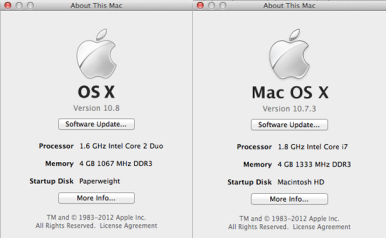These name changes are tangible proof that Apple is serious about bringing its desktop OS in line with its mobile one. The iOS platform has been increasingly popular—the company sells more iOS devices than it does Macs—so it makes sense for Apple to make this move. Here are the name changes we know are coming.

iChat becomes Messages:Gone are the days when you tell a friend, “Let’s iChat tonight.” With Mountain Lion, Apple is replacing iChat with a revamped Messages app, a name you see everyday on your iOS home screen. You’ll get all the same features you had with iChat, and much more—for example, Mac users will be able to use the iMessage feature introduced in iOS 5. (Check out our First Look at Messages.) Now you can just ask your pal, “Can you message me later?” And that, personally, sounds a lot more sane.
Address Book becomes Contacts: Lion’s Address Book will become Mountain Lion’s Contacts, renamed to match the iOS Contacts app. The name change is not the most significant thing with Contacts, and it’ll probably (hopefully!) only take you a second or less to get used to. Rather, Contacts in Mountain Lion will address some of the complaints users have had about the app in Lion.
iCal becomes Calendar: Like with Contacts, Apple is converging its Mac operating system with its mobile one with the newly-named Calendar. Again, the name isn't the most important change you'll be seeing with Mountain Lion's Calendar. We'll have a deeper look at how the new Calendar and Contacts address shortcomings of previous versions soon.

Mac OS X becomes OS X: While this isn't an app name change, dropping the Mac from OS X does draw less of a line between Apple's desktop and mobile operating systems. Pulling up the About This Mac window reveals that the ‘Mac’ prior to OS X has been officially dropped. You’ll see the difference on Apple’s PR materials as well—Lion is still referred to as Mac OS X Lion, but Mountain Lion is OS X Mountain Lion. What does this rebranding mean for the Mac? Our best guess: Not much. It’s likely just meant to make a clearer distinction between hardware and software, and as mentioned above, less of a distinction between operating systems.


